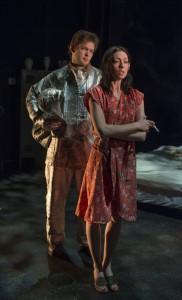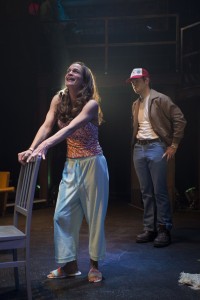NO CLOSURE IN BIRMINGHAM
Originally produced at Goodman Theatre in 1989, Sally Nemeth’s incendiary two-act, 125-minute Mill Fire depicts the origins and aftermath of its title disaster. This flash fire erupts at 2 a.m. in an ill-tended steel mill (itself basically a controlled fire) in Birmingham, Alabama circa 1978. It’s a small horror in a larger crisis: Once an American staple of progress, the entire industry is succumbing to workplace violations, foreign competition, cost-cutting risk-taking, even the unions’ need to  preserve jobs at the expense of safety. More trenchantly, this explosion from a badly maintained furnace has a human cost that Nemeth calculates in searing detail and contagious compassion. Now playing Theater Wit, Sandy Shinner’s staging, a gem from Shattered Globe Theatre, could not achieve better casting or generate more sheer conviction per minute.
preserve jobs at the expense of safety. More trenchantly, this explosion from a badly maintained furnace has a human cost that Nemeth calculates in searing detail and contagious compassion. Now playing Theater Wit, Sandy Shinner’s staging, a gem from Shattered Globe Theatre, could not achieve better casting or generate more sheer conviction per minute.
At the hurt heart of this slice of work are two women who lose their men in different and equally credible ways. Marlene (a haunting Kate LoConti) has supposedly held up a settlement by refusing to take “blood money” from the mill owners for the loss of her young husband Champ (Drew Schad, present especially in his absence), horribly burned in the blaze. Marlene’s hard-drinking, badly bored sister-in-law, the ironically named Sunny (unforgettable Rebecca Jordan) wants to leave her uninspiring Bo (a solidly flawed Ken Bradley): Ironically, his surviving a fire that he might have contributed to through pain pills and inattentiveness has preserved a sick marriage or given them a second chance.
 A memorial service a year later–organized by the plant proprietors for publicity purposes’”brings all losses to a boil. They’re echoed by a powerful Greek chorus of widows (Deanna Reed-Foster, Daria Harper and Angie Shriner) who work ceaselessly to hold onto their gone men through recollection and remorse. A mute and natural chorus’”the ceaseless rain, suffocating heat, and a rising creek’”drive home the despair. A minister (Kevin Viol) tries to make sense of this “senseless accident.” No one can understand why Marlene won’t accept compensation for her roasted husband’”and also signs a form preventing her from suing the owners. But then why should the sequel to a pointless and avoidable tragedy make any more sense than the fire itself?
A memorial service a year later–organized by the plant proprietors for publicity purposes’”brings all losses to a boil. They’re echoed by a powerful Greek chorus of widows (Deanna Reed-Foster, Daria Harper and Angie Shriner) who work ceaselessly to hold onto their gone men through recollection and remorse. A mute and natural chorus’”the ceaseless rain, suffocating heat, and a rising creek’”drive home the despair. A minister (Kevin Viol) tries to make sense of this “senseless accident.” No one can understand why Marlene won’t accept compensation for her roasted husband’”and also signs a form preventing her from suing the owners. But then why should the sequel to a pointless and avoidable tragedy make any more sense than the fire itself?
 What’s clear and compelling well before play’s end is Nemeth’s total grasp of the mechanism of mourning and its agents of forgiveness. It’s all built on the incredible realism of the strip mill itself’”kinetically suggested by Christopher Kriz’ surging sound design and set designer Jeff Bauer’s overhead buckets for molten steel with steam vents suggesting the blast furnaces. As flashbacks recreate what should have been an ordinary graveyard shift in a defective factory, ordinary details become accusations in themselves, charged with meaning because of the deaths to come.
What’s clear and compelling well before play’s end is Nemeth’s total grasp of the mechanism of mourning and its agents of forgiveness. It’s all built on the incredible realism of the strip mill itself’”kinetically suggested by Christopher Kriz’ surging sound design and set designer Jeff Bauer’s overhead buckets for molten steel with steam vents suggesting the blast furnaces. As flashbacks recreate what should have been an ordinary graveyard shift in a defective factory, ordinary details become accusations in themselves, charged with meaning because of the deaths to come.
Solidarity is almost too weak a word for Shinner’s nine dynamic performers. Using a kind of immersion therapy, they put us in their place. It’s theater at its most present and accounted for.
Mill Fire
Shattered Globe Theatre
Theater Wit, 1229 W. Belmont Ave.
Thurs-Sat at 8:00 pm, Sun at 3:00 pm
scheduled to end on June 7, 2014
for tickets, call (773) 975-8150
or visit www.theaterwit.org
for more info, visit www.shatteredglobe.org
for info on this and other Chicago Theater,
visit http://www.TheatreinChicago.com

